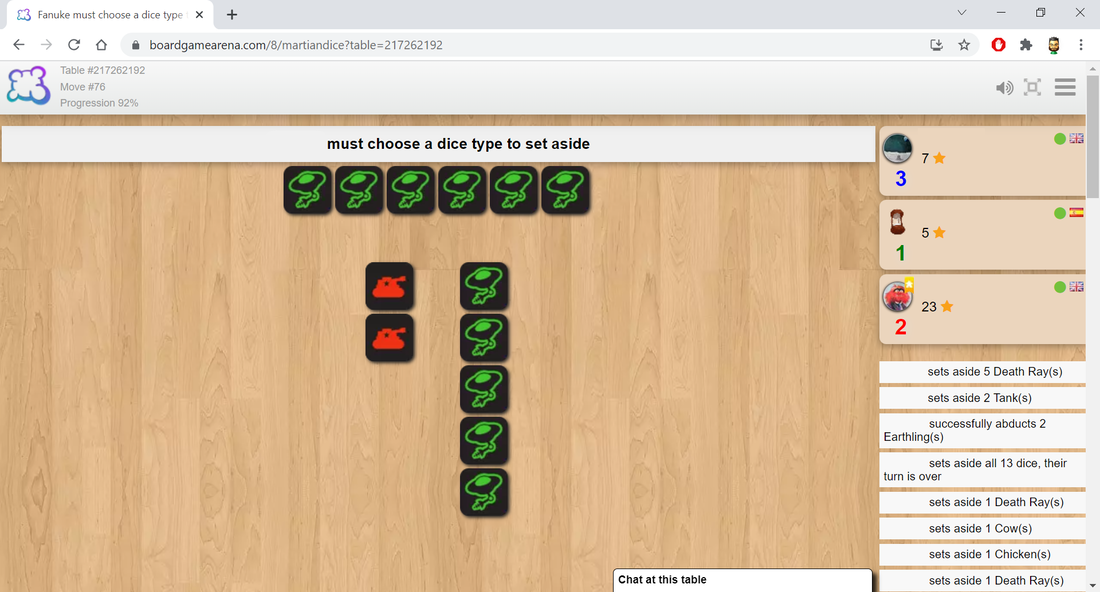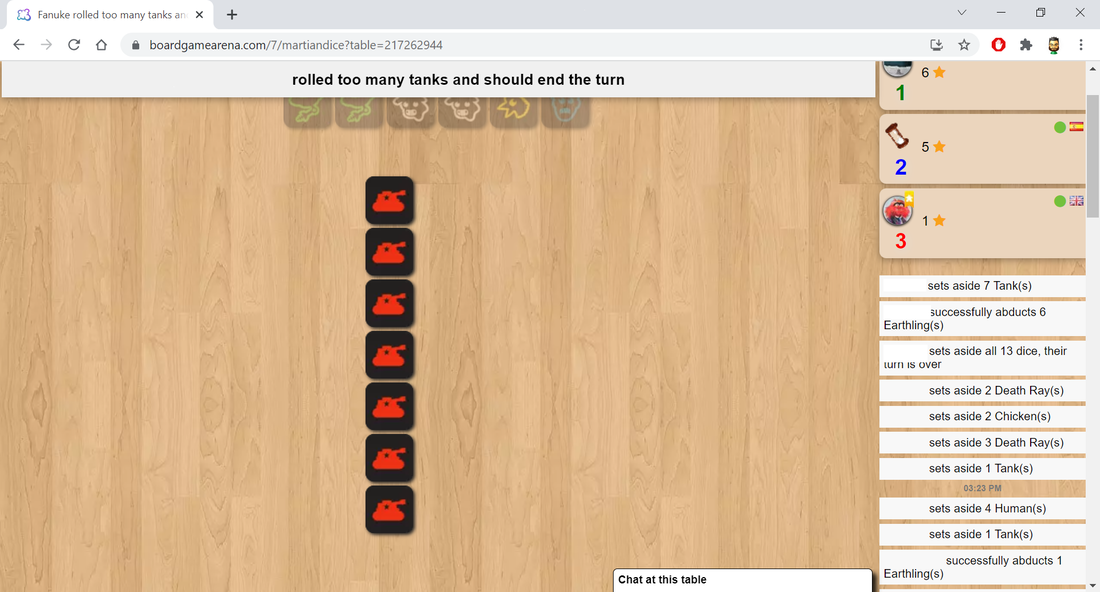|
29th July 2021 It's a Thursday and we're logged into Board Game Arena for some gaming entertainment. The first game was Martian Dice, it turns out that in Martian society abducting humans is a highly popular and competitive past time, players take the role of opportunistic Martians, flying around looking for hapless humans to kidnap as well as those old favourites - cows and errrrr.... chickens? Meanwhile, they'll also have to dodge all those pesky Sherman tanks sent by the US Government to harass them. Caveat: We've only ever played Martian Dice digitially. What's in a game? You'll be unsurprised to learn that Martian Dice is a dice game that comes with 13 standard 6 sided dice. All dice are identical and come with the following symbols on their faces.
How's it play? Martian Dice is a pretty straightforward push your luck game and players can continue rolling dice until they choose to or are forced to stop.
Endgame The game continues until a player scores 25 or more points, then the current round is concluded. Points are tallied, highest score wins. Overall This is usually where I blog about what I think of a game, but with Martian Dice, it's a little trickier. This is because at the time of writing, we've only ever played the game digitally and the version of Martian Dice we played on Board Game Arena appears to be quite broken! Why? In a word (Or acronym.); R.N.G. - random number generation. Computers can't actually, truly, generate numbers randomly, they can only do an approximation of it and any game that contains any random element will be affected by this to some lesser or greater degree - and that's probably most tabletop games on Board Game Arena! So why am I singling out Martian Dice? In game that's only about throwing lots of dice, when the randomness does go skew-whiff, it can become readily apparent. Look at the examples below. I don't know the odds of the rolls that occurred above, but they must've have been very long. These kinds of results weren't particularly uncommon either, every few rounds something would pop up that just looked too improbable.
This skewed randomness did however, generally appear to affect all players equally which mitigated it somewhat, but it did alter the way we played the game. Anyway back to my conclusion. Martian Dice really only ever gives players 2 decisions to make. What dice shall I keep? Should I continue my turn or not? Luckily, at least 1 of these decisions is generally always a meaningful decision. Players will only get 3 scoring opportunities per turn, they'll sometimes be faced with the decision of scoring fewer points now and locking out that scoring type or hoping to get a better result later at the risk of getting 0 points. It can put players in a painful predicament - in a good way! The other key hard decision players will have to make is choosing to put aside scoring dice or death-rays to battle tanks, especially as invariably a couple of tanks will have turned up. Go for the points now and hope to be able to deal with the tanks later? Or deal with the tanks now and hope points will turn up on another roll, albeit one with fewer dice? Perhaps a player will get lots of death-rays early on; they could put them aside to deal with tanks that will appear in later rolls, on the other hand, putting aside this many death-rays lessens the chances of getting scoring results. Finally players will frequently have to decide whether to push their luck or not. Because of how the scoring mechanism works, it obvious when there's no point pushing on and when it's got a chance to score more points. The question is; is it worth the risk? Sometimes players will have to roll because they've got too many tanks in play, other times - well getting just one of that type a player hasn't got would score 4 extra points! However, if the tanks and death-rays set aside are close in numbers, an unfortunate roll will bust they player. All of these decisions will of course be contextual, but the game gives players a fairly clear risk/reward choice to make. Martian Dice is a light, quick to learn and play, luck-based (sic) game, it definitely has some nuance and strategy but it will also appeal to fans of push your luck mechanics. If you want a game not too taxing on the grey matter and works as a filler, Martian Dice could work well for you. We found it a good finisher at the end of an evening of play.
0 Comments
Leave a Reply. |
AuthorI play, I paint. Archives
March 2024
Categories
All
|



 RSS Feed
RSS Feed
